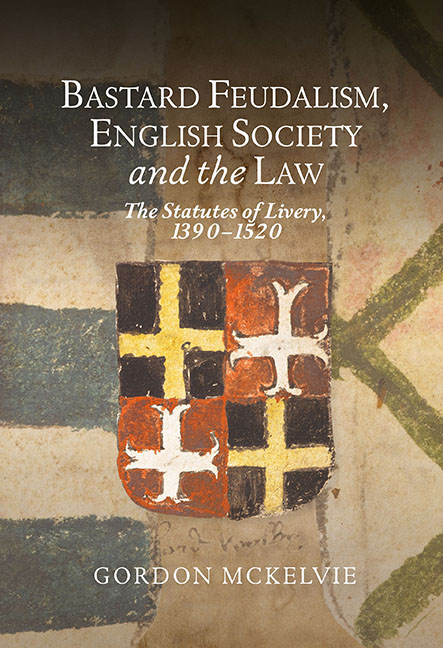Book contents
- Frontmatter
- Contents
- Acknowledgements
- Abbreviations
- Timeline of Parliamentary Activity
- Introduction
- Chapter 1 The System – Liveries and Retaining
- Chapter 2 The Early Years, 1390 to 1449
- Chapter 3 The Later Years, 1449 to 1520
- Chapter 4 Outcomes and Enforcement
- Chapter 5 The Identity of the Indicted
- Chapter 6 The Geography of the Cases
- Chapter 7 Networks and Localities
- Chapter 8 Livery and Disorder
- Chapter 9 The Urban Experience
- Conclusion
- Appendix 1 Number of Cases by Reign
- Appendix 2 Number of Cases in each County
- Appendix 3 List of Letters to Towns and Lordships
- Appendix 4 List of Local Ordinances
- Appendix 5 Letters from Henry VII to Duchy of Lancaster Officials
- Bibliography
- Index
Chapter 9 - The Urban Experience
Published online by Cambridge University Press: 02 April 2020
- Frontmatter
- Contents
- Acknowledgements
- Abbreviations
- Timeline of Parliamentary Activity
- Introduction
- Chapter 1 The System – Liveries and Retaining
- Chapter 2 The Early Years, 1390 to 1449
- Chapter 3 The Later Years, 1449 to 1520
- Chapter 4 Outcomes and Enforcement
- Chapter 5 The Identity of the Indicted
- Chapter 6 The Geography of the Cases
- Chapter 7 Networks and Localities
- Chapter 8 Livery and Disorder
- Chapter 9 The Urban Experience
- Conclusion
- Appendix 1 Number of Cases by Reign
- Appendix 2 Number of Cases in each County
- Appendix 3 List of Letters to Towns and Lordships
- Appendix 4 List of Local Ordinances
- Appendix 5 Letters from Henry VII to Duchy of Lancaster Officials
- Bibliography
- Index
Summary
As Chapter 5 demonstrated, townsmen were a component of many bastard feudal affinities and many townsmen were indicted for illegal livery. The problems associated with townsmen wearing the liveries of feuding lords are illustrated by a mandate given to the mayor and aldermen of Kingston-upon-Hull on 27 June 1443 which ordered them to inquire into all transgressions against the statutes of livery. Certain burgesses had accepted the livery of magnates, which meant that ‘a grievous quarrel has arisen among the burgesses of the town’. Concerns about townsmen wearing noble liveries are evident in the initial debates about liveries during the late fourteenth century. A Commons petition in 1393 complained about the lack of enforcement of the 1390 act and stated that among those engaged in these disruptive practices were people with various urban occupations such as tailors, drapers, cobblers, fishmongers and butchers. The Livery Act of 1429 exempted mayors during their period in office, while the 1468 act gave to the relevant civic officials ‘within eny such cite, burgh, towne port’ the power to hear cases. This clause essentially formalised certain existing practices. Earlier royal charters had given the right to hear and determine livery cases to Norwich in 1452, Canterbury in 1453, Derby in 1459, and Rochester and Colchester in 1462. The statutes acknowledged that urban communities were part of a wider system of retaining and livery granting and many townsmen were indicted, but there has been no attempt to consider this phenomenon more broadly.
In a seminal article on medieval government Gerald Harriss noted the importance of the nobility and leading churchmen in the governing of England, in particular when the king was unable to govern because he was too young, too infirm or out of the kingdom. However, one aspect of government not considered by Harriss was towns. Although towns were not involved in the running of the kingdom when the king was unable to fulfil his duties, they were key partners in the operation of government. English towns enjoyed various rights and liberties which successive kings granted them, and towns operated within the wider political system of late medieval England that had patronage at its heart.
- Type
- Chapter
- Information
- Bastard Feudalism, English Society and the LawThe Statutes of Livery, 1390–1520, pp. 181 - 201Publisher: Boydell & BrewerPrint publication year: 2020



